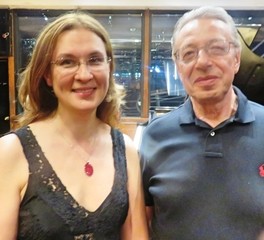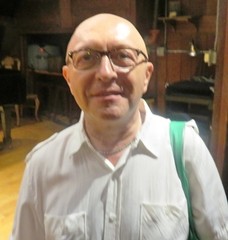|
Back
When a Hedgehog Passes Away New York
BargeMusic
06/23/2017 -
Israel Kemen: Prelude and Fugue in A Major
Michael Zeiger: L’Escalade
Volodymyr Runchak: Dedication to M. K.
Toshimitsu Tanaka: Variations and a Passacaglia on a theme from Mozart’s “Magic Flute”
Waleed Howrani: Social Insecurity Stomp – Two Tired to Tango
Astor Piazzolla: Adios Nonino
Irena Portenko (Pianist) 
I. Portenko, M. Zeiger (© Samuel A. Dog)
Irena Portenko is a prodigious pianist. A professor at the Westchester Conservatory, she received high marks from the New York Times for a performance of the complete Chopin Etudes in Carnegie Hall, she has performed throughout Europe and Asia and has her own summer music festival in Austria.
This was the first time I heard her play, yet, judging from her program, it was difficult to really speak about her prowess. Five of the six composers were completely unknown to me, and the sixth, Astor Piazzolla, was represented with one of his last works, a doleful sequel to Nonino, called appropriately Adios Nonino.
Yet Ms. Portenko is evidently a fine keyboard artist. While one couldn’t equate her interpretations with others, most of her music was digitally challenging, and she met the challenge with error-free confidence. Still, while her choices were all from all living composers, they were each anachronistic, they showed composers who, while using some dissonance, were far back in time.
True, Michael Zeiger’s L’Escalade was quite complex, a deft Baroque-style fugue (with a few Russian/Ukrainian modal phrases) expanding into a Chopin-esque ballade form. Ms. Portenko had no problems traveling along Mr. Zeiger’s paths, returning to the original fugue theme. It was poetic enough, it showed the marks of a well-trained writer.
The next work was rather strange, Toshimitsu Tanaka had been commissioned to write something Mozartean for a Japanese music academy, and he chose Papageno’s “Ein Mädchen oder Weibchen”, a purposely simple ditty (which some say came from Mozart’s pet starling). The result was a work which–save for one variation that alluded to a South American rhythm–could have come from Beethoven’s original music, one of those variations that would have been so early, it would have been numbered WoO.

I. Kemen (© Samuel A. Dog)
Outside of Mr. Zeiger, Israel Kemen was the second composer who showed up for a short delightful Prelude and Fugue. But a work for which I anticipated great things sort of...well, sunk.
The Ukrainian composer Volodymyr Runchak wrote a work for that playful, complex Argentinian composer Mauricio Kagel. But attempting to imitate him with two Kagel-like titles–Afternoon Rest of the Mosquito and Death of the Hedgehog–didn’t quite hit the mark. Ms. Portenko followed the instructions (to yawn, to fall asleep at the keyboard), and then to play the “mosquito” work like a latter-day “Flight of the Bumblebee”, and “Hedgehog” movement with a single high C, plucked from inside the piano.
(His third movement, “Variation”, a repetition of the second movement, was the same C plucked several times. It was not puzzling, but it fizzled.)
Ms. Portenko introduced Waleed Howrani’s two movements by stating, “We will continue this humorous theme...” The mock 1930’s Fats Waller-style tune and slight tango were not humorous but were amiable ephemera.
After the Piazzolla, Ms. Portenko continued with the single flashy encore–and a sumptuous flashy Toccata it turned out to be. The Ukrainian Arkady Filippenko wrote a piece for dazzling fingerwork, with a Ukrainian modal theme, and a work which showed just what a fine pianist Ms. Portenko can be. One only wishes that at her next BargeMusic concert she chooses more substantial works from–if not more established–more original composers.
Harry Rolnick
|